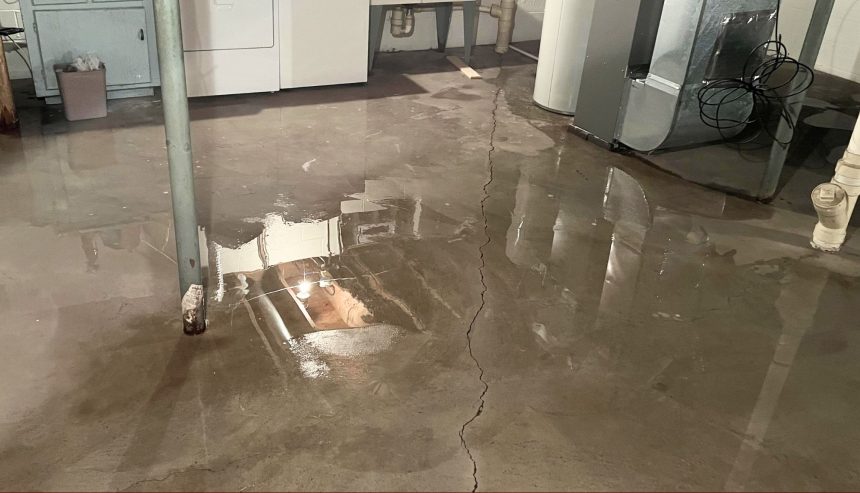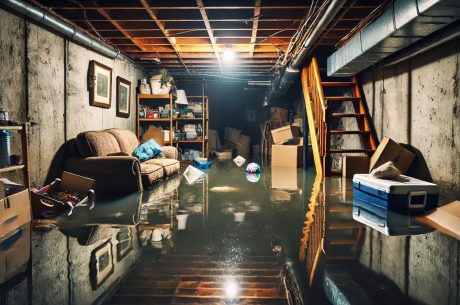Table of Contents
Basement flooding can be a nightmare for any homeowner, leading to costly damage and potential long-term issues if not addressed promptly. Whether it’s a finished space or a storage area, a flooded basement can destroy belongings, weaken a foundation, and even lead to mold growth. Understanding the causes of basement flooding is key to preventing this disaster from happening in the first place.
In this post, we’ll explore the 10 most common reasons why basements flood and how you can protect your home from water damage.
What is Basement Flooding?
Basement flooding occurs when water accumulates in a basement space, often due to external factors like heavy rain, poor drainage, or plumbing issues. The water can seep in through cracks in the foundation, enter through windows or doors, or result from a malfunctioning sump pump.
Flooding can range from a small puddle to several inches (or feet) of standing water. It poses serious risks to a home’s structure, electrical systems, and can lead to issues like mold, mildew, and damaged belongings.
10 Most Common Causes of Basement Flooding
1. Heavy Rainfall
Excessive rain can overwhelm drainage systems, leading to water accumulation around the foundation, which eventually seeps into the basement.
2. Poor Drainage
Improperly graded landscaping or clogged gutters can cause water to pool around your home’s foundation, increasing the risk of basement flooding.
3. Sump Pump Failure
A malfunctioning or overwhelmed sump pump can allow water to back up and flood the basement during heavy rains or rising groundwater levels.
4. Cracks in Foundation Walls
Over time, foundation walls can develop cracks that allow water to seep into the basement, especially during wet conditions.
5. Sewer Backup
A clogged or overloaded municipal sewer system can cause wastewater to flow back into a home’s basement through floor drains.
6. Faulty or Broken Pipes
Leaky or burst pipes, often due to freezing in colder months, can cause significant water damage and flooding in basements.
7. Window Well Leaks
Poorly installed or unmaintained window wells can allow rainwater to collect and leak through basement windows.
8. Improperly Installed Waterproofing Systems
An inadequately installed or outdated waterproofing system can fail to protect your basement from water intrusion.
9. Underground Water Table Rise
In areas with high groundwater levels, water pressure can push moisture up through the foundation, leading to flooding.
10. Clogged or Broken Gutters and Downspouts
If gutters and downspouts are clogged, water can’t be directed away from the home, which can lead to water pooling near the foundation and seeping into the basement.
Understanding these common causes can help homeowners take preventive measures to protect their basements from flooding and avoid costly damage. You should also know how to keep water away from your basement.
For Fast Basement flood cleanup in New Jersey – Call PuroClean Emergency Recovery Services New Jersey on (877) 750-7876
FAQs About Basement Flooding
What should I do immediately after discovering basement flooding?
First, ensure everyone in the home is safe and the power is turned off in the affected area to avoid electrical hazards. Remove any valuable items and start the process of water removal using a wet vacuum or pump. Contact a professional for help with water damage restoration and to assess any potential structural issues.
How can I prevent basement flooding?
Regular maintenance is key. Ensure gutters and downspouts are clean and directing water away from your foundation. Check for and repair any cracks in the foundation. Install or maintain a sump pump and consider waterproofing your basement with appropriate measures like sealing walls and installing proper drainage systems.
Will homeowner’s insurance cover basement flooding?
Coverage can vary depending on your policy and the cause of the flooding. Standard homeowner’s insurance may cover certain types of water damage, but flooding caused by natural disasters often requires additional flood insurance. Review your policy details and consider adding flood insurance if necessary.
How can I tell if my basement is at risk for flooding?
Signs include water stains on walls or floors, musty odors, and persistent dampness. You may also notice issues with grading around your home or water pooling near the foundation after rain. Conducting a professional inspection can help identify vulnerabilities and recommend solutions.
What are the long-term effects of basement flooding?
Long-term effects can include mold and mildew growth, which can impact indoor air quality and health. Structural damage, such as weakened foundations or wood rot, can also occur. Promptly addressing water damage and repairing any issues can help mitigate these long-term effects.




 PuroClean Emergency Fire, Water and Mold Damage Restoration New Jersey
PuroClean Emergency Fire, Water and Mold Damage Restoration New Jersey